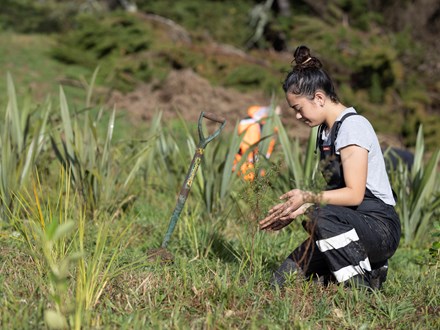We ran a webinar on this last year sharing the perspectives of young disrupters challenging our ways of working, that aren’t working for most of us. Hot Take: Young disruptors are changing the game for good
Being part of the ecosystem of Te Whakaoranga o Te Puhinui facilitates a different way of being. It is less about your ‘job’ and more about the capacities, experimentation and empathy you bring to support restorative work.
As we transition beyond Jobs for Nature, we are interested in the skills we need to grow, no matter what our job title, to support regeneration and restorative systems change.
This means everyone understanding their role in facilitating wellbeing. This means continuing to build a culture that actively and safely questions configurations and activities that reinforce the status quo. This means taking responsibility as Tangata Tiriti in what we prioritise, in our efforts and actions.
We have much more work to do. Here are some starting points which have supported our journey.
Centre for Social Impact places restoration and healing of people and whenua at the heart of systems change. This approach draws on mātauranga Māori wisdom and science around healing collective and intergenerational trauma. Trauma requires a different pace to be restored. Often healing needs to come before strengthening or scaling up. This is a felt experience for us working with communities in Te Puhinui. Systems change work requires deep reflective practice and vulnerability. You must be comfortable being real, disorientated, lost and often wrong. Tohu, or signs, are observed and guide continuous learning and adaptation. We highly recommend engaging with the Ngahere webinar series and the Haumanu framework to support yourself and your teams in nurturing these capacities.
Te Pūaha Talks - Ngahere - nurturing our connectivity • Centre for Social Impact
Haumanu - restorative systems change • Centre for Social Impact
Indigenous design frameworks such as Practice Foundations: Hautū Waka — The Lab help us to move beyond so-called ‘expert-led’ approaches to enable wayfinding and learning by doing. Our mahi in the Puhinui has been an exploration of ways of working that attune to tikanga, indigenous knowledge and the complexity of the environments we are operating in.
These skills are all fundamentally interlinked and support culture-led approaches and the valuing of local maramatanga as core to regeneration. With any place-based kaupapa, lived experience and insight are essential. Working alongside our delivery partners on the ground has reinforced the need to start where whānau and hapori are and work with their strengths. Genuine collaborative partnership embraces diverse ways of knowing, doing and being. This includes respecting Tikanga and prioritising the indigenous systems view and insights from mātauranga Māori as the starting point. Values-led approaches that build cultural capability and reciprocal relationships enable this.
We have learned a lot from our partners Te Pu-a-Nga Maara about the importance of the maramataka and tirohanga - tohutaka in guiding what we do, why, how we do it, and when. Waananga with Dr Ihirangi Heke exploring the Atua Matua framework has been described time and time again as one of the most transformative experiences for the Taiao Rangers. There are many local experts such as Ayla Hoeta | The Spinoff who work alongside Te Pu-a-Nga Maara and others to develop resources and experiences bringing this knowledge back into community consciousness.
These frameworks are grounded in observation, experiential learning, ancestral stories and ancient wisdom which guides our co-evolution as part of te taiao. It’s about threading ourselves back into the web of life. Seeing ourselves as part of integral awa and whenua ecosystems, from the mountains to the sea.
This is also about embracing a future where vocational pathways will encourage emotional, spiritual and new forms of intelligence. This is what systems change is really about. This is what changes everything.
This work is essential for our health, vitality and wellbeing. Yet it often remains misunderstood, under-valued and under-invested in. We are working alongside our partners to change this.
Our collaborators are growing the capacities to revitalise the role humans play as part of healthy ecosystems. We are collectively committed to harmonising the balance between what we do each day and how we interact with the whenua. We acknowledge this is imperative in responding to ever-changing weather patterns and biodiversity loss. It takes courage to confront these realities, and to face ourselves and our responsibilities.
For the rangatahi we work with, this is a felt experience. They embrace the healing that is necessary. They understand that revitalising the diversity of ecosystems is also about revitalising diversity and collaboration between knowledge-systems and worldviews. They invite us to walk alongside them on the journey.
The journey of the Te Pu-a-nga Maara Taiao Rangers and Makaurau Marae Nursery reminds us what regeneration is really about. Revival and reconnection with critical social, cultural, ancestral and environmental systems. Empowering and enabling young people to lead and be self-determining in growing the skills and capabilities to thrive. Employment that fits the needs of people. Regenerating the places and environments they are a vital part of.

